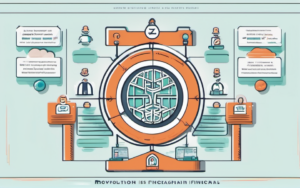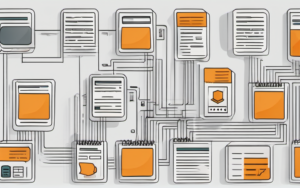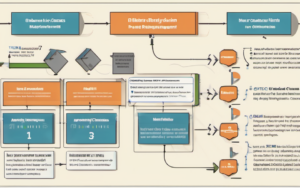The world of technology is constantly evolving, and one of the most significant advancements in recent years has been the rise of blockchain technology. Beyond its association with cryptocurrencies, blockchain holds immense potential to revolutionize various sectors, including government and voting systems. Blockchain Voting is poised to reshape how we interact with our governments and participate in democratic processes.
Blockchain’s Impact on Government and Voting Systems
Introduction: The Rise of Blockchain Technology
Blockchain technology is a decentralized, distributed ledger that records transactions in a secure and transparent manner. Its key features, such as immutability, transparency, and security, have attracted significant attention from various sectors, including governments.
Transparency and Accountability in Government
Blockchain’s inherent transparency can dramatically improve governance by fostering greater accountability and trust.
Secure and Tamper-Proof Records
Government records, from financial transactions to land registries, can be stored on a blockchain, creating a secure and tamper-proof system. This eliminates the possibility of data manipulation or corruption, enhancing public trust in government operations.
Enhanced Public Trust and Participation
By providing a transparent and verifiable record of government activities, blockchain can increase public trust and engagement. Citizens can easily access and verify information, fostering a more informed and engaged citizenry.
Revolutionizing Voting Systems
Blockchain technology can revolutionize traditional voting systems by addressing long-standing concerns about security, transparency, and accessibility.
Secure and Verifiable Elections
Blockchain-based voting systems can ensure the integrity of elections by providing a secure and verifiable record of every vote cast. This eliminates the possibility of fraud, manipulation, or double-voting, strengthening the democratic process.
Increased Voter Participation and Accessibility
Blockchain-based voting systems can make voting more accessible to individuals who are traditionally excluded, such as those living overseas or with disabilities. The decentralized nature of blockchain allows for secure and convenient voting from any location with internet access.
Challenges and Considerations
While blockchain offers significant potential for government and voting systems, several challenges need to be addressed before widespread adoption.
Scalability and Performance
Scaling blockchain systems to accommodate large-scale government operations or national elections can be challenging. The technology needs to be optimized to handle high transaction volumes and ensure efficient processing.
Privacy and Data Security
Protecting voter privacy and data security is crucial in blockchain-based voting systems. Secure protocols and encryption methods must be implemented to safeguard sensitive information.
Regulatory Frameworks and Legal Compliance
Developing comprehensive regulatory frameworks and legal guidelines for blockchain-based governance and voting systems is essential. These frameworks should ensure security, privacy, and compliance with existing laws and regulations.
Future Outlook: A Decentralized Future for Governance
The adoption of blockchain technology in government and voting systems has the potential to usher in a new era of decentralized governance.
Smart Contracts and Automated Processes
Smart contracts, self-executing agreements stored on the blockchain, can automate government processes, such as issuing licenses, processing permits, or distributing benefits. This can streamline operations and improve efficiency.
Citizen-Centric Governance Models
Blockchain can empower citizens to participate more actively in governance by providing direct channels for feedback, suggestions, and decision-making. This can lead to more responsive and inclusive government models.
The Potential for a More Equitable and Transparent Society
By promoting transparency, accountability, and citizen participation, blockchain technology has the potential to create a more equitable and transparent society. This can empower individuals and communities to hold their governments accountable and demand better services.
The implementation of blockchain technology in government and voting systems is still in its early stages. However, the potential benefits are undeniable, and the future of governance may be shaped by this groundbreaking technology. As blockchain matures and its adoption grows, we can expect to see a more transparent, efficient, and participatory form of governance.



